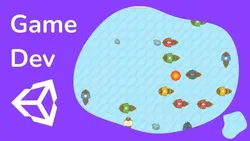
Unity 2D Game Development Course 
This course provides an introduction to Unity 2D game development, teaching students with no prior experience how to create a PC game from a board game. Students will learn how to use the free Unity game engine to turn the board game Rush Hour into a PC game, gaining valuable skills in game design and development. ▼
ADVERTISEMENT
Course Feature
![]() Cost:
Cost:
Free Trial
![]() Provider:
Provider:
Skillshare
![]() Certificate:
Certificate:
No Information
![]() Language:
Language:
English
![]() Start Date:
Start Date:
On-Demand
Course Overview
❗The content presented here is sourced directly from Skillshare platform. For comprehensive course details, including enrollment information, simply click on the 'Go to class' link on our website.
Updated in [March 06th, 2023]
The Unity 2D Game Development Course is designed to teach students with no experience how to turn a board game into a PC game. Using the free game engine Unity, students will learn how to make a fully functioning game and how to create levels from scratch. By the end of the course, students should have an understanding of Unity & Visual Studio Installation, Navigating In Unity, Steps Required For Game Creation, Basic C# Programming, Designing Levels For Your Game, Importing Art Assets, Creating UI & Menus, How To Build/Export Your Game, Implementing Music, and Basic Game Design Principles. This class is suitable for all ages and no prior knowledge is required. Students will need 6-7 hours of free time, a modern PC/Mac capable of installing and running Unity, and an internet connection to download Unity and Visual Studio.
[Applications]
Students who have completed this Unity 2D Game Development Course will be able to apply their knowledge to create their own 2D games. They will be able to use the Unity game engine to create levels, import art assets, create UI and menus, and build and export their game. Additionally, they will have a basic understanding of C# programming and game design principles.
[Career Paths]
Recommended Career Paths:
1. Game Developer: Game developers are responsible for creating and developing video games. They use programming languages and game engines to create the game’s code and design the game’s visuals. Game developers must have a strong understanding of game design principles and be able to work with a team of other developers. The demand for game developers is increasing as the gaming industry continues to grow.
2. Level Designer: Level designers are responsible for creating the levels and environments in video games. They use game engines and level editors to create the levels and design the game’s visuals. Level designers must have a strong understanding of game design principles and be able to work with a team of other developers. The demand for level designers is increasing as the gaming industry continues to grow.
3. Game Artist: Game artists are responsible for creating the visuals for video games. They use 3D modeling software and game engines to create the game’s visuals. Game artists must have a strong understanding of game design principles and be able to work with a team of other developers. The demand for game artists is increasing as the gaming industry continues to grow.
4. Game Tester: Game testers are responsible for testing video games for bugs and other issues. They use game engines and debugging tools to test the game’s code and design the game’s visuals. Game testers must have a strong understanding of game design principles and be able to work with a team of other developers. The demand for game testers is increasing as the gaming industry continues to grow.
[Education Paths]
Recommended Degree Paths:
1. Bachelor of Science in Computer Science: This degree path provides students with a comprehensive understanding of computer science fundamentals, including programming, software engineering, and computer architecture. It also covers topics such as artificial intelligence, computer graphics, and computer networks. This degree is ideal for those interested in developing games and other interactive applications.
2. Bachelor of Arts in Game Design: This degree path focuses on the creative aspects of game design, such as storyboarding, level design, and character development. It also covers topics such as game mechanics, game theory, and game production. This degree is ideal for those interested in creating immersive and engaging experiences for players.
3. Master of Science in Computer Science: This degree path provides students with an advanced understanding of computer science fundamentals, including programming, software engineering, and computer architecture. It also covers topics such as artificial intelligence, computer graphics, and computer networks. This degree is ideal for those interested in developing games and other interactive applications.
Developing Trends:
1. Virtual Reality: Virtual reality (VR) is becoming increasingly popular in the gaming industry, and many game developers are now incorporating VR into their games. This technology allows players to experience a game in a more immersive way, and it is becoming increasingly popular in the gaming industry.
2. Augmented Reality: Augmented reality (AR) is another technology that is becoming increasingly popular in the gaming industry. AR allows players to interact with the game in a more realistic way, and it is becoming increasingly popular in the gaming industry.
3. Cloud Computing: Cloud computing is becoming increasingly popular in the gaming industry, and many game developers are now incorporating cloud computing into their games. This technology allows players to access their games from any device, and it is becoming increasingly popular in the gaming industry.
Pros & Cons

Clear instructions and easy to follow.

Explained in detail.

Beginner friendly and informative.

Helpful teacher and answers questions.

Quickly expand game with what was taught.

Little to no prior experience needed.

Some courses lack explanation of code.

Improvement needed.

Not enough for multiplayer platformer game.

Not enough for advanced learners.
Course Provider

Provider Skillshare's Stats at AZClass
Discussion and Reviews
0.0 (Based on 0 reviews)
Explore Similar Online Courses

Adapting: Career Development

Symfony Security: Beautiful Authentication Powerful Authorization

Python for Informatics: Exploring Information

Social Network Analysis

Introduction to Systematic Review and Meta-Analysis

The Analytics Edge

DCO042 - Python For Informatics

Causal Diagrams: Draw Your Assumptions Before Your Conclusions

Whole genome sequencing of bacterial genomes - tools and applications

Learn Unity 3D and C# By Making a Full Game (2023)

Asset Creation and Management

Unity 3D - Create a Reusable UI System
 Related Categories
Related Categories
 Popular Providers
Popular Providers
Quiz
 Submitted Sucessfully
Submitted Sucessfully
1. What is the estimated time to complete the course?
2. What is the minimum hardware requirement to run Unity?
3. Is the course suitable for all ages?
4. What is the required time to complete the course?
Correct Answer: 6-7 hours


Start your review of Unity 2D Game Development Course